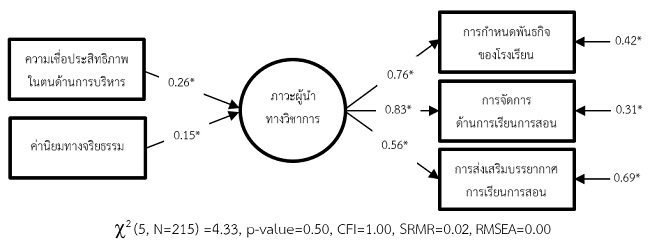“SKILLED AND MORAL LEADERS” A CAUSAL MODEL OF INSTRUCTIONAL LEADERSHIP OF ASPIRING SCHOOL LEADERS
DOI:
https://doi.org/10.14456/nrru-rdi.2021.72Keywords:
instructional leadership, administration self-efficacy, moral valueAbstract
Educational administrators need to be both skilled and moral leaders. This research had three main objectives, they were 1) to compare the level of instructional leadership, administration self-efficacy and moral value of aspiring school leaders, 2) to develop and validate a causal model of instructional leadership, and 3) to examine the causal effects of administration self-efficacy and moral value on instructional leadership. The research sample included 215 aspiring school leaders. Data were collected using convenience sampling. This research used a 5-point Likert scale questionnaire which reliability was 0.80. Managing the instructional program was viewed by the research participants as the most important dimension of instructional leadership. The research participants who preferred administration to teaching reported a higher level of all 3 dimensions of instructional leadership than those who thought otherwise. The research’s causal model revealed that a structural equation model fit to the sample data (c2=4.33, p=0.50, CFI=1.00, SRMR=0.03, RMSEA=0.00) with administration self-efficacy and moral value as predictors, and instructional leadership as the outcome variable. The model accounted for 9% of variance in instructional leadership. This research concluded both administrative skills and moral value should be embedded across educational administration programs, so a new crop of school leaders may become a role model.
References
ÇAlik, T., SezgİN, F., Kavgaci, H., & KilinÇ, A. Ç. (2012). Examination of relationships between Instructional leadership of school principals and self-efficacy of teachers and collective teacher efficacy. Educational Sciences: Theory & Practice, 12(4), 2498-2504.
Chan, T. C., Chandler, M., Turan, S., Kpeglo, S., & Du, R. (2014). Roles and responsibilities of school principals: A five country comparison. The SRCEA Yearbook 2014, Mississippi State University Press. Retrieved October 11, 2021, from https://www.dropbox.com/s/ a4zdh7yo46mx8su/Yearbook2014AdditionFinal.pptx?dl=0
Graduate Division. (2021). Trends of graduate students of College of Education. Retrieved October 1, 2021, from http://sp-grad.edu.ku.ac.th/ (In Thai)
Grissom, J. A., & Loeb, S. (2011). Triangulating principal effectiveness: How perspectives of parents, teachers, and assistant principals identify the central importance of managerial skills. American Educational Research Journal, 48(5), 1091-1123.
Hair, J. F., Black, W. C., Babin, B. J., & Anderson, R. E. (2010). Multivariate data analysis (7th ed.). Upper Saddle River, NJ, USA : Pearson Education.
Hallinger, P. (2010a). A review of three decades of doctoral studies using the principal instructional management rating scale: A lens on methodological progress in educational leadership. Educational Administration Quarterly, 47(2), 271-306.
Hallinger, P. (2010b). Developing instructional leadership. In B. Davies, and M. Brundrett, (eds.). Developing successful leadership (pp. 61-76). Dordrecht : Springer.
Hallinger, P., & Huber, S. (2012). School leadership that makes a difference: International perspectives. School Effectiveness and School Improvement, 23(4), 1-9.
Hallinger, P., & Murphy, J. (1985). Assessing the instructional management leadership behavior of principals. The Elementary School Journal, 86(2), 272-309.
Hallinger, P., & Wang, W. C. (2015). Assessing instructional leadership with the principal instructional management rating scale. Hong Kong : Springer International Publishing.
Halpern, C., Szecsi, T., & Mak, V. (2021). “Everyone can be a leader”: Early childhood education leadership in a center serving culturally and linguistically diverse children and families. Early Childhood Education Journal, 49(4), 669-679.
Hughes, W., & Pickeral, T. (2013). School climate and shared leadership. Retrieved October 11, 2021, from https://schoolclimate.org/wp-content/uploads/2021/05/sc-brief-leadership.pdf
Jansopa, N. (2015). Needs analysis in instructional leadership development for primary school administrators. Thesis, Master of Education Program in Educational Administration, Chulalongkorn University, Bangkok. (In Thai)
Joreskog, K. G., & Goldberger, A. S. (1975). Estimation of a model with multiple indicators and multiple causes of a single latent variable. Journal of the American Statistical Association, 70(351), 631-639.
Kelloway, E. K. (1998). Using LISREL for structural equation modeling: A researcher's guide. CA : Sage Publication.
Lambert, L. (2002). The constructivist leader. New York : Teachers College Press.
Liu, S., & Hallinger, P. (2018). Principal instructional leadership, teacher self-efficacy, and teacher professional learning in China: testing a mediated-effects model. Educational Administration Quarterly, 54(4), 501-528.
Ministry of Education. (2007). Guidelines for educational decentralization, administration and management in the year 2007. Retrieved October 11, 2021, from http://backoffice.oneco.th/uploaded/Category/Laws/RuleMetDistEdMnt2550-02-12-2010.pdf (in Thai)
Nanthachai, S. (2011). Professional ethics for educational administrator. Bangkok : Samchareon Publishing. (in Thai)
Rosseel, Y. (2012). lavaan: An R package for structural equation modeling. Journal of Statistical Software, 48(2), 1-36.
Schrag, F. (1979). The principal as a moral actor. In D.A. Erickson, and T.L. Reller. (eds). The principal in metropolitan schools (pp. 208-232). CA : McCutchan Publishing.
Sebastian, J., Allensworth, E., Wiedermann, W., Hochbein, C., & Cunningham, M. (2019). Principal leadership and school performance: An examination of instructional leadership and organizational management. Leadership and Policy in Schools, 18(4), 591-613.
Sripetchdee, N., & Kiatwateeratrana, T. (2018). Vicharn Panit: How to learn and when to change. Retrieved October 11, 2021, from https://thepotential.org/knowledge/prof-vicharn-panich/ (In Thai)





